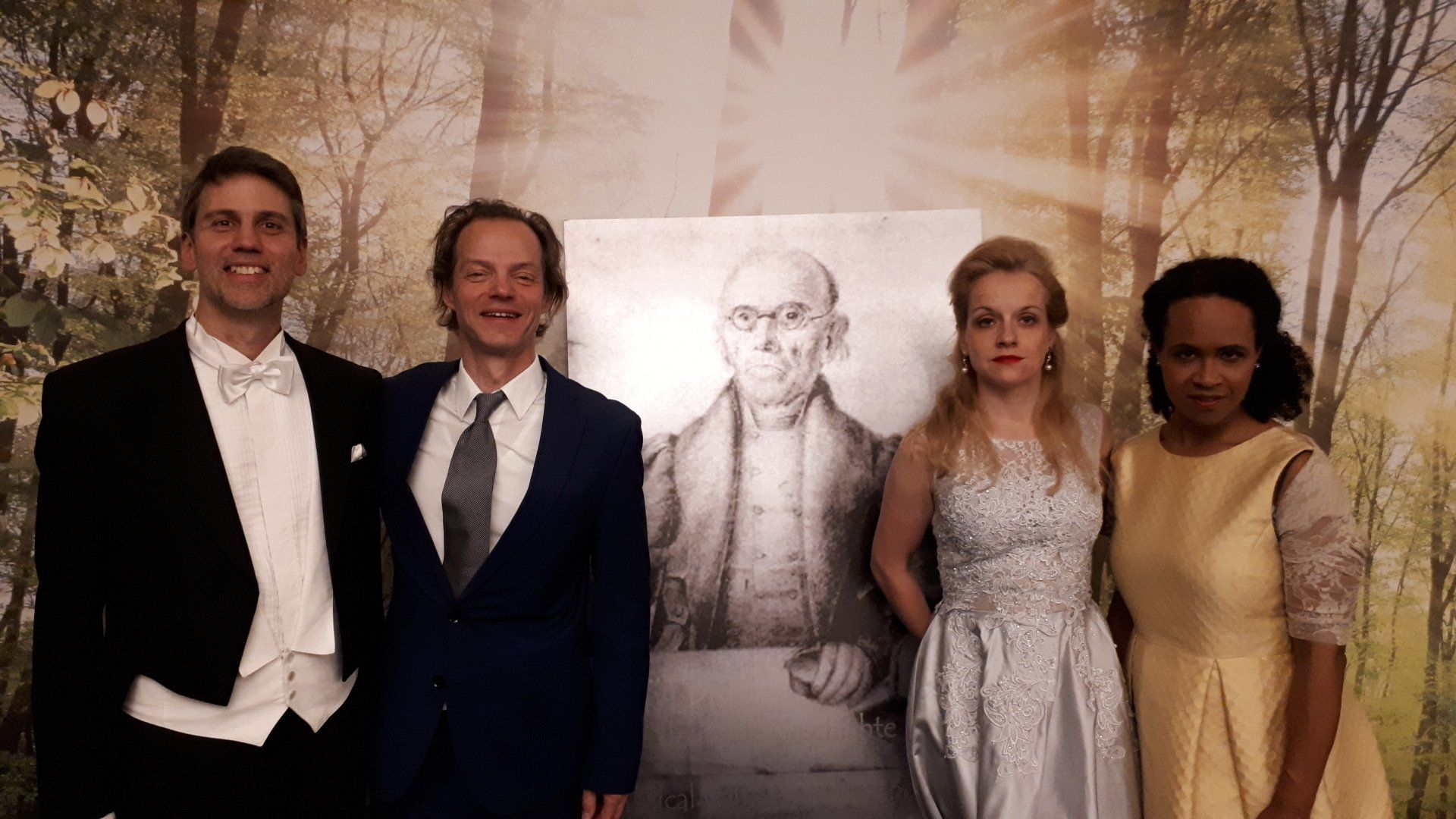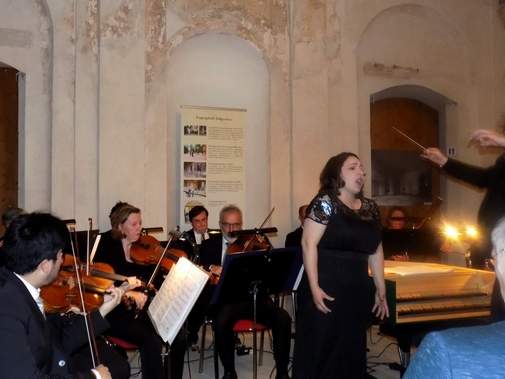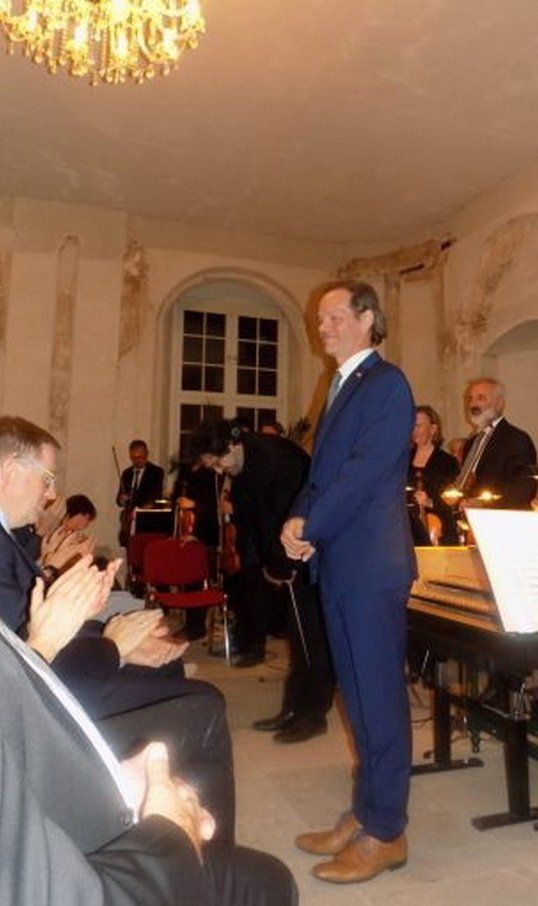Hurry
(Antje Flath, November 4th, 2019, FreiePresse, abridged)
Oberwiesenthal.
Ingolf Huhn managed the surprise. The director of the Eduard von Winterstein Theater in Annaberg-Buchholz had a special guest and a special program item for the 27th theater ball of the association's support association: Stefan Vinzberg, tenor from Berlin and more than ten years ago as such on stage in the Erzgebirge, presented the first excerpts from his as yet unpublished musical "Stülpner - a German story" in front. Music "that no one in the world has heard before," commented the director.
The more than 260 guests on the first of two ball nights on Friday evening heard two duets and a psalm on the life stages of the legendary folk hero. There was plenty of applause for these "three appetizers" - even if the piece is still being worked on. In any case, director Ingolf Huhn is already very interested in showing the finished work in the Ore Mountains - after all, that's where it belongs. At the moment, however, none of the participants can say when this will happen.
...
Premiere at Schloss Zerbst: Excerpts from the opera "Katharina - die deutsche Zarin" can be heard during a serenade.
Annegret Mainzer, 24.09.2019, Volksstimme (full article: image link)
Zerbst | On Saturday evening (September 21st) Dirk Herrmann, chairman of the Zerbst Castle Association, announced a positive "attack", because the word "attack" in Russian means a sold-out house. All tickets were sold out just two days after the concert evening was announced.
“Tsarina Catherine the Great would have been 290 years old this year. For this reason we opened the German-Russian special exhibition "On the trail of Catherine" in Zerbster Castle on June 1st, and we continue to pay tribute to our daughter's great daughter with this year's castle serenade under the motto "Petersburg Serenade - A Concert for Tsarina Catherine" City, ”said Herrmann in his welcoming speech.
...
Power of a future tsarina
"This is the high point and the end of the aria of 14-year-old Sophie, who hopes to escape the humiliations of the mother by the call of Empress Elisabeth," said composer Stefan Vinzberg, who also came to the concert. When listening to the aria, the audience should feel that the young woman can already sense the power of a future tsarina.
Musical trip to Saint Petersburg
...
Furthermore, the audience had a second world premiere that night, the ball music from Vinzberg's opera. Without a doubt, these were exciting moments for the composer sitting in the audience.
The sequences of the ball music are very different, sometimes enjoyable - you can see dancing young couples in front of your eyes - but also fanfare-like, festive sounds can be heard, which may announce the arrival of important personalities on the ball.
...
Enjoyment for the audience
The 13th edition of the Zerbster castle serenade was ultimately a complete success, both for the participants as well as for the organizers and a real pleasure for the audience. This was not only due to the high level of skill of the soloists and the orchestra, but also due to its captivating chief conductor and his entertaining moderation, which was greeted with rapturous applause from the audience.
Annegret Mainzer, 24.09.2019, Volksstimme (full article: image link)
Zerbst | On Saturday evening (September 21st) Dirk Herrmann, chairman of the Zerbst Castle Association, announced a positive "attack", because the word "attack" in Russian means a sold-out house. All tickets were sold out just two days after the concert evening was announced.
“Tsarina Catherine the Great would have been 290 years old this year. For this reason we opened the German-Russian special exhibition "On the trail of Catherine" in Zerbster Castle on June 1st, and we continue to pay tribute to our daughter's great daughter with this year's castle serenade under the motto "Petersburg Serenade - A Concert for Tsarina Catherine" City, ”said Herrmann in his welcoming speech.
...
Then there was a world premiere for which many guests were waiting, the aria of Princess Sophie Auguste Friederike from Stefan Vinzberg's opera "Katharina - die deutsche Zarin", sung by the German-Moroccan soprano Miriam Sabba. "Until the end of my life, I swear to God (...) I want to be a man", sings young Sophie at the beginning and at the end it says: "So being a woman is nice (...). Maybe I'll have a choice tomorrow. ”
"This is the high point and the end of the aria of 14-year-old Sophie, who hopes to escape the humiliations of the mother by the call of Empress Elisabeth," said composer Stefan Vinzberg, who also came to the concert. When listening to the aria, the audience should feel that the young woman can already sense the power of a future tsarina.
"That is why a versatile voice was needed that drowned out the large orchestra at the end and thus showed the princess's ability to make future decisions of great importance," explains Vinzberg. A claim that Miriam Sabba fully met.
...
Furthermore, the audience had a second world premiere that night, the ball music from Vinzberg's opera. Without a doubt, these were exciting moments for the composer sitting in the audience.
The sequences of the ball music are very different, sometimes enjoyable - you can see dancing young couples in front of your eyes - but also fanfare-like, festive sounds can be heard, which may announce the arrival of important personalities on the ball.
When asked what he was thinking about when composing this ball music, Stefan Vinzberg replied: "To the Katharina Ball in Zerbst."
The 13th edition of the Zerbster castle serenade was ultimately a complete success, both for the participants as well as for the organizers and a real pleasure for the audience. This was not only due to the high level of skill of the soloists and the orchestra, but also due to its captivating chief conductor and his entertaining moderation, which was greeted with rapturous applause from the audience.
"The conductor selected the audience's nerve with his choice of music," concert visitor Birgit Lemke said enthusiastically at the end of the evening. This opinion was unreservedly followed by other visitors.
(Bettina Volksdorf, MDR Kultur, main editorial office culture / music, editing music theater)
https://www.mdr.de/kultur/videos-und-audios/audio-opernmagazin-stephen-costello-elisabeth-rethberg-award100.html
https://www.mdr.de/kultur/videos-und-audios/audio-opernmagazin-stephen-costello-elisabeth-rethberg-award100.html
The triumphant musical return of Catherine the Great to the German Motherland
Annegret Mainzer, Zerbst
September 21, p. In the birth castle of the Russian Empress Catherine the Great in Zerbst / Anhalt there was a grand concert-performance called St. Petersburg Serenade - a concert for the Empress Catherine, dedicated to the 290th anniversary of the birth of Catherine the Great.
In connection with this concert, the collected funds were transferred to the non-profit Society Zerbst Castle, whose goal will be to restore the Zerbst Castle destroyed in April 1945.
Guests and musicians were welcomed by Dirk Herrmann, chairman of the Zerbst Castle Society. Among the guests were Andreas Dittmann, Mayor of Zerbst / Anhalt, and composer Stefan Wintzberg, who wrote the opera Catherine, the German Empress.
greeting guests
Jan Michael Horstmann that evening was not only the main conductor of the Central German Chamber Orchestra of Schönebeck, he also acted as the host of the evening.
The first part of the concert, called Zerbst, began with Johann Strauss, the son of the Waltz King. It sounded almost forgotten these days by the waltz by Elba, whose premiere took place on November 28, 1897 in Vienna.
An overture to the suite was written by the German composer Johann Friedrich Fache (1688-1758), who in 1722 was appointed the court bandmaster of Prince Anhalt-Zerbst.
An overture to the orchestral suite of Muscovites was also performed, belonging to the pen of composer Georg Philipp Telemann, who was born in 1681 in Magdeburg. By the way, his grandson Georg Michael Telemann (* 1748) in 1773 was appointed music director and cantor of the main cathedral in Riga, where he died in 1831.
Let us return to the concert in Zerbst Castle: Without a doubt, one of the culmination of the concert was the premiere of the aria of the Zerbst Princess Sofia Until the end of my life from the opera, Catherine is the German Empress of the Berlin composer Stefan Wienzberg. The aria was performed by the German-Moroccan co-player Miriam Sabba. She delighted the audience with her vocal skills.
co-player Miriam Sabba
The second part of the evening concert was dedicated to the city of St. Petersburg. The musical masterpieces of the Italian opera composer Francesco Domenico Araya (1709-1767 / 1771?), Who was the court bandmaster under Elizabeth Petrovna (1709-1761), were played. Aria from his opera The power of love and hatred was sung by the co-composer Miriam Sabba.
Listeners of the concert that evening experienced moments of excitement and joy - the premiere of ballroom music from the Winzberg opera. Composing ballroom music, he thought about a ballroom evening at Zerbst Castle, said composer Stefan Vintzberg.
composer Stefan Winzberg
From the opera of Antigone by the Italian composer Tommaso Traett (1727-1779), an aria sounded My torment ended. Traetta from 1769-1775 He was the court bandmaster under Catherine the Great in St. Petersburg.
A worthy conclusion to the concert at Zerbst Castle was the famous waltz Farewell to St. Petersburg, which Johann Strauss-son wrote in memory of his repeated tour in Russia. In this regard, we must not forget that he was the conductor of the then-famous Pavlovsk summer concerts for ten years.
All musical compositions chosen by the conductor J. M. Horstmann for a concert in Zerbst Castle were connected with the life of Catherine the Great, with her German and Russian homeland.
The idea of long-term peaceful relations between the Germans and the Russians, in general, passed through the whole concert as a red thread.
Everything - a co-player, conductor and host and orchestra - is undoubtedly on top. Time passed quickly for the audience, this is due not only to the magnificent performance of the musical masterpieces described in the article, but also to the host’s lively eloquence.
Annegret Mainzer, author of this article, and Stefan Vintzberg
Zerbst, September 27, 2019
September 21, p. In the birth castle of the Russian Empress Catherine the Great in Zerbst / Anhalt there was a grand concert-performance called St. Petersburg Serenade - a concert for the Empress Catherine, dedicated to the 290th anniversary of the birth of Catherine the Great.
In connection with this concert, the collected funds were transferred to the non-profit Society Zerbst Castle, whose goal will be to restore the Zerbst Castle destroyed in April 1945.
Guests and musicians were welcomed by Dirk Herrmann, chairman of the Zerbst Castle Society. Among the guests were Andreas Dittmann, Mayor of Zerbst / Anhalt, and composer Stefan Wintzberg, who wrote the opera Catherine, the German Empress.
greeting guests
Jan Michael Horstmann that evening was not only the main conductor of the Central German Chamber Orchestra of Schönebeck, he also acted as the host of the evening.
The first part of the concert, called Zerbst, began with Johann Strauss, the son of the Waltz King. It sounded almost forgotten these days by the waltz by Elba, whose premiere took place on November 28, 1897 in Vienna.
An overture to the suite was written by the German composer Johann Friedrich Fache (1688-1758), who in 1722 was appointed the court bandmaster of Prince Anhalt-Zerbst.
An overture to the orchestral suite of Muscovites was also performed, belonging to the pen of composer Georg Philipp Telemann, who was born in 1681 in Magdeburg. By the way, his grandson Georg Michael Telemann (* 1748) in 1773 was appointed music director and cantor of the main cathedral in Riga, where he died in 1831.
Let us return to the concert in Zerbst Castle: Without a doubt, one of the culmination of the concert was the premiere of the aria of the Zerbst Princess Sofia Until the end of my life from the opera, Catherine is the German Empress of the Berlin composer Stefan Wienzberg. The aria was performed by the German-Moroccan co-player Miriam Sabba. She delighted the audience with her vocal skills.
co-player Miriam Sabba
The second part of the evening concert was dedicated to the city of St. Petersburg. The musical masterpieces of the Italian opera composer Francesco Domenico Araya (1709-1767 / 1771?), Who was the court bandmaster under Elizabeth Petrovna (1709-1761), were played. Aria from his opera The power of love and hatred was sung by the co-composer Miriam Sabba.
Listeners of the concert that evening experienced moments of excitement and joy - the premiere of ballroom music from the Winzberg opera. Composing ballroom music, he thought about a ballroom evening at Zerbst Castle, said composer Stefan Vintzberg.
composer Stefan Winzberg
From the opera of Antigone by the Italian composer Tommaso Traett (1727-1779), an aria sounded My torment ended. Traetta from 1769-1775 He was the court bandmaster under Catherine the Great in St. Petersburg.
A worthy conclusion to the concert at Zerbst Castle was the famous waltz Farewell to St. Petersburg, which Johann Strauss-son wrote in memory of his repeated tour in Russia. In this regard, we must not forget that he was the conductor of the then-famous Pavlovsk summer concerts for ten years.
All musical compositions chosen by the conductor J. M. Horstmann for a concert in Zerbst Castle were connected with the life of Catherine the Great, with her German and Russian homeland.
The idea of long-term peaceful relations between the Germans and the Russians, in general, passed through the whole concert as a red thread.
Everything - a co-player, conductor and host and orchestra - is undoubtedly on top. Time passed quickly for the audience, this is due not only to the magnificent performance of the musical masterpieces described in the article, but also to the host’s lively eloquence.
Annegret Mainzer, author of this article, and Stefan Vintzberg
Zerbst, September 27, 2019







